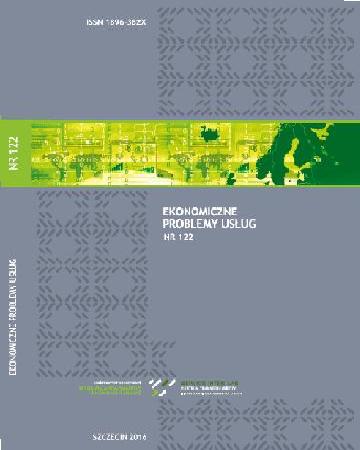
ISSN: 1896-382X
eISSN: 2353-2866
OAI
DOI: 10.18276/epu.2018.131/1-06



Issue archive /
nr 131 (1) 2018
Theoretical and practical aspects of economic information transparency
| Authors: |
Agnieszka
Budziewicz-Guźlecka
Uniwersytet Szczeciński Wydział Zarządzania i Ekonomiki Usług Anna Drab-Kurowska Uniwersytet Szczeciński Wydział Zarządzania i Ekonomiki Usług |
| Keywords: | information economics of information Economic Information Offices |
| Data publikacji całości: | 2018-05-24 |
| Page range: | 11 (57-67) |
| Klasyfikacja JEL: | O16 G20 |
Abstract
Information and knowledge and ways of transferring them are some of the most valuable and rudimentary components of today’s world. The article aims at presenting the idea of economic information and possibility of verifying it as regards its transparency. Information is used as a basis for determining the scope of business activity of a given entity and its organizational units (depart-ments or divisions). Additionally, it is a basis for decision making both operational (current) and strategic, expanding to the future and aimed at improving management and reducing risk. For this reason, economic information offices play an important role in the flow of information. They help verifying the status of consumers and companies as regards their creditworthiness and effective cooperation.
Download file
Article file
Bibliography
| 1. | Ackoff, R.L. (1967). Management Misinformation Systems. Management Science, 14 (4), 147–156. |
| 2. | Budziewicz-Guźlecka, A. (2013). Wiedza i kapitał ludzki czynnikiem rozwoju przemysłów krea-tywnych. In: J. Stankiewicz, Z. Binek, S. Kotylak (eds.), Przemysł kreatywny – ekonomia na styku kultury i biznesu [Knowledge and human capital as a factor for developing creative industries. In: Creative industry – economy at the interface of culture and business] (pp. 84–99). Zielona Góra: MAjUS s.c. |
| 3. | Checkland, P., Holwell, S. (2002). Information, Systems and Information Systems: making sense of the field. Chichester: John Wiley & Sons. |
| 4. | Czaplewski, M. (2011). Dobra informacyjne i ich podstawowe cechy ekonomiczne. Zeszyty Nau-kowe Uniwersytetu Szczecińskiego, 650. Ekonomiczne Problemy Usług, 67 (vol. 1), pp. 20–26. |
| 5. | Czaplewski, M. (2012). Informacja – jej podstawowe koncepcje i komponenty. Zeszyty Naukowe Uniwersytetu Szczecińskiego, 746. Ekonomiczne Problemy Usług, 101, pp. 55–67. |
| 6. | Czyżycki, R. (2016). An individual investor in the Polish capital market. Szczecin: Scientific Pub-lisher of the University of Szczecin. |
| 7. | Drab-Kurowska, A. (2011). Wykorzystanie technologii informatycznych w komunikacji marketin-gowej. Ekonomiczne Problemy Usług, 68 (vol. 2), 674–681. |
| 8. | Drab-Kurowska, A. (2013). Polityka konkurencji na rynku e-commerce. Ekonomiczne Problemy Usług, 104 (vol. 1), 501–511. |
| 9. | Dunn, J.M. (2008). Information in computer science. In: P. Adriaans, J. van Benthem (eds.), Phi-losophy of Information (pp. 581–608). Amsterdam–Oxford: Elsevier. |
| 10. | Floridi, L. (2008). Trends in the philosophy of information. P. Adriaans, J. van Benthem (eds.), Philosophy of Information (pp. 113–131). Amsterdam–Oxford: Elsevier. |
| 11. | Matulewski, M. (2015). Analiza porównawcza efektywności strategii cenowych wybranych ele-mentów komunikacji miejskiej na przykładzie aglomeracji seulskiej i londyńskiej. Finanse, Rynki Finansowe, Ubezpieczenia, 73, 913–920. |
| 12. | Oleński, J. (2001). Ekonomika informacji. Warszawa: PWE. |
| 13. | Shannon, C. (1948). A mathematical theory of communication. The Bell System Technical Journal, 27, 379–423. |
| 14. | Shannon, C., Weaver, W. (1964). Mathematical Theory of Communication. Urbana: The Universi-ty of Illinois Press. |
| 15. | Law on providing and exchanging economic information of 9th April 2010 (JoL 2010 no. 81 item 530). |
| 16. | https://www.big.pl (5.01.2018). |
| 17. | https://erif.pl (5.01.2018). |
| 18. | http://krd.pl (5.01.2018). |
| 19. | http://www.kidt.pl (6.01.2018). |
| 20. | https://www.kbig.pl (6.01.2018). |